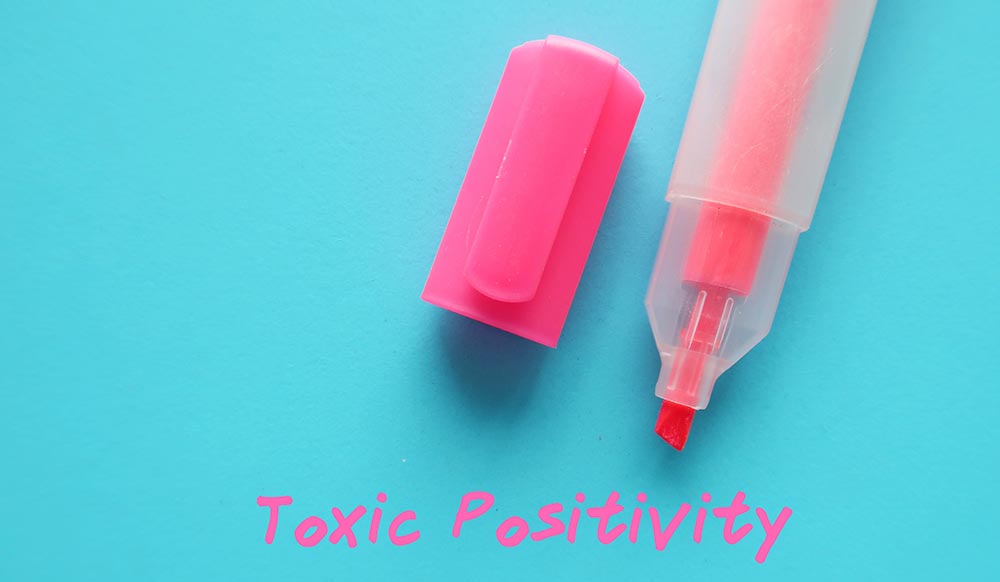Outdoor Life
Point to ponder: Is it possible to be too ‘positive’?

By Jan White
There’s been a recent upswing in the use of the term ‘toxic positivity,’ a phrase that intrinsically sounds a bit confusing. After all, isn’t the whole point of positivity about being positive?
A good start to understanding what ‘toxic positivity’ is might be to explain what it’s not. It is not the positive, genuine concern or encouragement from friends, family, or colleagues at the right time. It is not the recognition and acknowledgment of life events like illness, loss of a loved one, or relationship breakups and processing them so we can feel better or move forward. Setting difficult emotions aside temporarily is sometimes necessary. But toxic (i.e., harmful) positivity takes optimism to the extreme and can prevent people from processing their feelings. Psychology Today defines toxic positivity as “the act of avoiding, suppressing, or rejecting negative emotions or experiences.”
An example of toxic positivity could be someone talking themselves into focusing on the optimistic aspects of an abusive relationship, hoping their partner will change, rather than seeing the situation for what it truly is.
An ‘always look on the bright side’ idealism could stifle the ability to face uncomfortable realities and the healthy changes that need to be made.
While toxic positivity may not be ill-intentioned, it can still be unproductive and harmful.
Users of social media can be notorious for exhibiting toxic positivity. Not only do they bombard us with memes continuously telling us, “Don’t worry, be happy,” no matter what, but sites like Facebook, Instagram, and TikTok have become platforms where users display only the ‘good stuff’ that is going on in their lives. This inauthentic representation that everything is perfect offers unrealistic expectations for their followers whose lives aren’t as seemingly idyllic and can result in guilt, shame, sadness, and anxiety, thus making their positivity ‘toxic.’
Some experts believe the workplace is a breeding ground for toxic positivity. Asking employees to maintain a positive attitude even when facing challenging situations or lacking an avenue to express negative emotions can lead to anxiety or depression. The feeling of being unable to express concerns or suggest improvements can also hinder an employee’s work performance.
Coworkers can sometimes add, if sometimes inadvertently, to positivity stress. Say you’re in the break room refilling your coffee cup, and a coworker tells you that his dog passed away last week, or his wife has cancer, or he’s afraid he might lose his job. Responses like “Well, think positive thoughts,” “I’m sure it will all work out,” or “Just hang in there” won’t help his situation. They might even worsen it by not validating his emotions while at the same time shutting down interactions that might have given him an avenue to discuss his concerns. Now he may feel like he has to put on a façade rather than own up to his true feelings. And from a production standpoint, emotional suppression like this could affect not only his job but also his whole work team.
Sometimes we unintentionally resort to a form of toxic positivity because we feel like our words are inadequate, and we don’t know what to say to the person struggling with a negative emotion. What if your coworker came to you depressed because her presentation bombed? If you tell her not to worry about it, it was terrific, and the audience didn’t appreciate her effort; your ‘positivity’ has just become non-helpful and could be construed as toxic. Instead, you might respond with, “I know how you feel. Do you want me to look over it first next time?” Or “Is there anything I can do to help?” Now you’ve offered a solution and left an avenue for discussion open that doesn’t suppress her unhappiness over the failed performance.
Obviously, there’s nothing intrinsically wrong with showing optimism and encouragement. These are traits that help human beings thrive. But always searching for the ‘silver lining’ in a bad situation can be detrimental to resilience. Robert Frost was famous for saying, “The best way over is through.” While negative emotions are difficult to deal with, they are part of our navigation through life. The ability of a person to adjust or recover from illness, adversity, significant life changes, or crisis is the very fabric on which our humanity is constructed.
So next time you are tempted to answer negative emotions with “Just stay positive,” “Good vibes only,” or “Failure is not an option,” maybe replace them with “I’m listening,” “That must be really hard,” or “Sometimes bad things happen, how can I help?” Not only are you helping to combat toxic positivity, but you’ve also become a true source of encouragement and hope.
You are a guest
or post as a guest
Be the first to comment.



